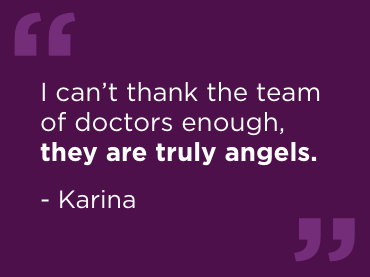The Challenge
When 37-year-old Mexico native Karina Tapia began having trouble with her vision, her eye doctor advised that it was nothing to be worried about and the symptoms would eventually go away.
Relieved, she continued with her busy life as a full-time mother of three very active children. But when her vision symptoms worsened, including severely blurred and double vision, she knew there was something seriously wrong.
After doing some research of her own, she went to see another eye doctor for a second opinion. He ran multiple tests and determined that the symptoms were not related to her eyes – they were neurological. Karina was then referred to a neurosurgeon in Mexico.
After an MRI was performed, she received a diagnosis that nearly made her collapse.
“What he told me was something that I would never expect and that I never thought would happen to me,” she said. “I was just in shock.”
Schedule an Appointment or Ask a Question
Karina was diagnosed with a meningioma, or a tumor of the protective linings of the brain. Because of the large size of the tumor, it was pressing on her optic nerve, directly causing the vision problems. If the tumor wasn’t removed, it would continue to grow, causing more severe and potentially life-threatening symptoms.
The Path to UPMC
Karina and her husband, Christian, wanted to get other professional opinions on how to best treat the tumor. Because the surgical options in her hometown of Matehuala were very invasive and involved a lengthy recovery and the risk of serious complications, they were willing to travel for better care.
“We knew of a surgeon in Mexico City who was considered one of the best in the country, so we flew there to get an opinion,” said Karina. “And this trip was the one that pretty much saved my life.”
The surgeon reviewed Karina’s scan and said she would be an excellent candidate for the Endoscopic Endonasal Approach (EEA), which allows for the removal of tumors through the nose and sinuses. Although the surgeon did not perform EEA, he knew who to recommend to Karina. After watching a video demonstration online, Karina knew she had to have her surgery at UPMC, which is where EEA was pioneered.
“After seeing that video and learning more about the treatment and how there is no actual incision in the skull, I contacted UPMC right away to get the process started,” she said.
Karina and her husband worked with UPMC Global Care to connect with the neurosurgeon, and to arrange for transportation and lodging. And within four weeks, the pair made the flight from Mexico to Pittsburgh.
The Solution
Additional testing was required to confirm what Karina’s doctor in Mexico had diagnosed. After a few days of appointments and preparation, Karina underwent the procedure that she traveled thousands of miles for. During the surgery Drs. Paul Gardner and Carl Snyderman, removed a tumor the size of an egg through Maria’s nose, immediately taking the pressure off her optic nerves and other important structures in her brain.
“Pretty much as soon as I woke up I knew that I was going to be alright,” said Karina. “I was nervous before surgery, but when the neurosurgeon told me that everything went perfect, I knew that I was going to be able to go home and see my kids, which made me so happy.”
The Results
A few days after the surgery, Karina was already starting to feel like her old self. Her symptoms were nearly nonexistent and she was ready to get back home.
“Everything went so well, I just can’t believe it,” she said. “It’s only been 13 days since the surgery and we are packing our bags and ready to head back to Mexico. I can’t thank the team of doctors enough, they are truly angels.”
Throughout her stay in Pittsburgh, Karina was aided by translators from UPMC Global Care, who helped her understand unfamiliar English words, and navigate both the hospital and the City of Pittsburgh.
“Global Care helped make what could have been a very stressful situation go very smoothly,” said Karina’s husband Christian. “They made us feel like we were right back home in Mexico.”
Our patient stories profile a number of patients who have had minimally invasive brain surgery at UPMC. Although everyone's care experience is unique, we hope that sharing these stories will help other prospective patients and their families better understand these procedures and their potential benefits.
Karina's treatment and results may not be representative of all similar cases.
















